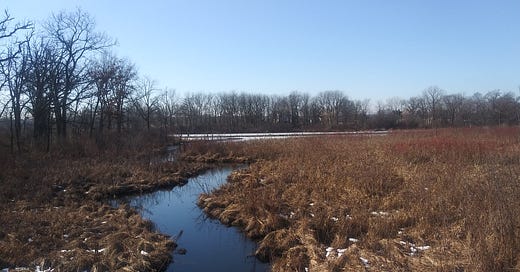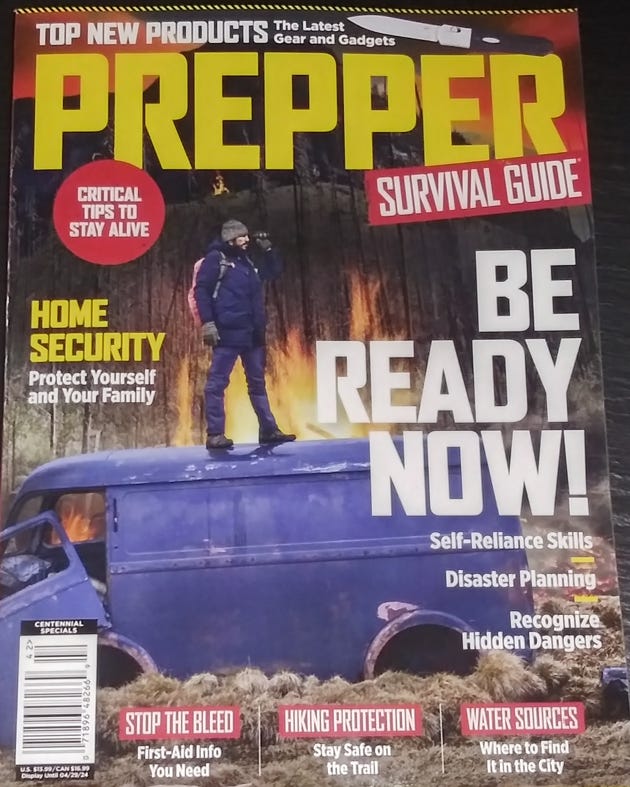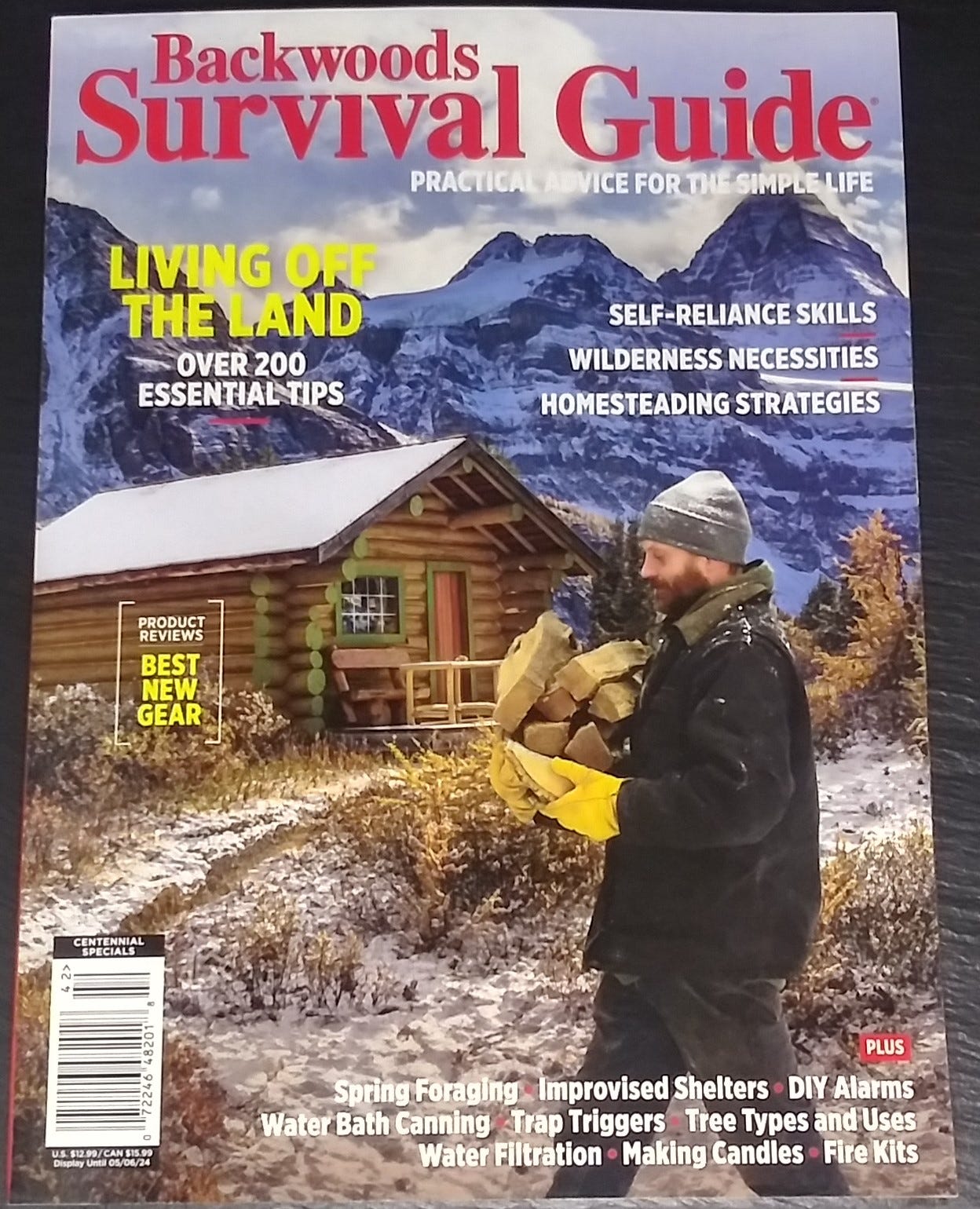Hey folks, thanks for checking out the newsletter this week. I have a ton of deadlines in front of me. At the same time, I’ve really had trouble concentrating and staying focused lately. Part of it is my back. While it’s getting better, it still gives me trouble if I sit too long or twist the wrong way. I dislike taking medication, so I’ve been just dealing with it. I’m hoping within a few more days, I’ll be back to whatever passes for normal these days.
Here's a peek at part of my work To Do list for the rest of this week and into early next week.
Write, format, and print handouts for my Prepping 101 class
Edit all layouts for Backwoods Survival Guide 29
Write a handful of articles for Prepper Survival Guide 23
Write Patreon posts each day
Determine article list for Prepper Survival Guide 24
Write a couple of product reviews
It looks like a lot to do in a short amount of time, but honestly, that’s kind of light compared to most weeks for me.
* * *
Prepper Tip -- I feel like most households fall into one of these two categories when it comes to finances.
1) One person is responsible for paying all of the household bills, often from a joint bank account where each person’s paycheck is deposited.
2) Each person pays certain bills from their own separate accounts. For example, one person handles rent and the power bill, the other pays for gas and groceries.
There are pros and cons to each arrangement, and every household has to figure out what works best for them. That’s all well and good, but what if the person paying some or all of the bills gets hurt (or worse) and is unable to continue handling that responsibility? Let’s say your spouse handles all of the bills, and something happens to them. Would you be able to step in and take over? Or, if you are the person who does the family books, and something happens to you, will others know what to do?
In an ideal world, the bill payer will have a list of accounts they handle, including log in information, that’s kept in a known location. He or she should update it as needed so that it is always as current as possible. Any special instructions could be noted for each account, such as any particular payment arrangements that were made with the account holder.
In the event of a death, that list would also be helpful for survivors to know which accounts can be closed right away, such as recurring charges for gym memberships and such.
Listen, nobody likes these types of conversations, but they need to happen. Better to get it done now, rather than waiting until it’s too late.
* * *
Reminder #1 – there’s a FREE class coming up called Disaster Preparedness and Survival: A Guide for Individuals, Families, and Communities. It be held March 23-24, 2024, in Stevens Point, Wisconsin. I believe the class will run roughly 8:00am-4:00pm on Saturday, and 8:00am-Noon on Sunday, but that’s not been confirmed yet. Here’s the description:
This course is designed to prepare individuals who may be directly affected by a disaster help themselves, their family and other community members. Participants will learn how to develop a family preparedness plan, practice self-rescue, perform search and light rescue techniques, and understand the recovery process.
I plan to attend this class myself. The location will be at the Portage County Annex Building, at 1462 Strongs Avenue, Stevens Point, WI 54481. I’m told that the class will run roughly 8AM-4PM the first day and 8AM-Noon the second day.
Registration is required. Scroll through to find the Stevens Point session and follow the instructions to register. The title for the class online is slightly different -- When Disaster Strikes: Prepare, Act, Survive – but I’m told it will be changed soon to reflect what I posted above.
You will need to sign up for a FEMA SID (Student ID). You’ll be prompted to do so during the registration process.
This is an in-person class. Attending virtually is not an option at this time. This might be a great opportunity to network with others, as well as learn some new things.
* * *
Reminder #2 – I'll be teaching a Prepping 101 class at Matheson Memorial Library in Elkhorn, WI on Feb 15th, beginning at 6PM. Class is free to attend and registration is not necessary. I'll also have a few stacks of back issues of Prepper Survival Guide and Backwoods Survival Guide available for purchase after the class ($10 each).
* * *
Prepping is, for many of us, a big part of our lives. It influences many decisions, from how we budget our money to what groceries we buy to where we choose to live. We read numerous books, we subscribe to several magazines, and we watch innumerable videos, all in hopes of learning one more skill or technique that we can add to our toolbox.
That's all well and good, admirable in fact. However, while prepping might influence your life, it shouldn't RUN your life. Yes, there is an awful lot of bad stuff going on in the world right now. There's no denying that. But you need to get out there and live your life. Prepping should not be about fear. Working toward being better prepared for whatever life tosses your way should result in confidence, not trepidation.
Keep your wits about you, of course. Maintain a constant level of situational awareness. But, don't let fear of the unknown be a driving force in your decision-making process. Life is meant to be lived. It is a journey to be experienced.
Eat the cookie. Stay up late and watch a stupid movie with your kids. Hug your dog. Take your spouse out to a fancy dinner or a picnic in the park. Go on a hike. Take a long drive somewhere new. Make love. Laugh at your own foibles. Invite a few friends over for a game night. Go see a play. Buy the ice cream cone. Tell your loved ones how you feel about them.
Live your life. Do it intelligently and with an eye toward common sense, but don't just sit at home afraid the boogeyman is going to get you.
* * *
About 40 minutes from our house, there’s a county park that has an authentically restored 1868 grist mill and several other attractions, along with hiking trails and such. We chose that for the site for this week’s hike. We’ve never managed to time our visits for when the gift store and other buildings are open, but it’s still a great place for a nice walk.
Survival Tip – Cold Weather Work Tips
Although we’re into February already, that doesn’t mean that winter is done with us. Even with all of the creature comforts we enjoy today, there’s the chance that we might have to venture out into the cold to handle some unexpected chores. Here are some tips to keep in mind.
Planks and Ladders – keep these flipped on their side or upside down when they aren’t in use outside. Otherwise, ice can form right where you’ll be putting your feet. If you don’t have space in the garage for them, store them on their side on the ground. If the footing for your ladder is a bit sketchy, you can use the claw side of a hammer or a similar tool to chisel out the snow and ice and create sort of a hole for the ladder’s feet.
Leg Gaiters – these can be great for keeping your pants dry if you’re dealing with deep snow. They simply slip over your legs from about the knee down to the boot. They work well in muddy conditions, too. Anything you can do to help keep your feet dry is desirable. If your lower legs get covered in snow, as it melts it will find its way into your boots. Gaiters prevent that from happening.
Gloves and Mittens – I’ll be the first to admit that I tend to overlook the importance of hand protection when I’m working outside. Most gloves are just too damn clumsy for a lot of chores. The alternative is to risk frostbite. Plus, frozen fingers don’t bend as well. So, as I’ve gotten older, and arguably wiser, I’ve started to bundle up my hands more often. Something to keep in mind – mittens are generally warmer than gloves. When the temps get really low, which in my area means -15F or lower, I’ll double up on the hand protection and wear a thin pair of gloves with a pair of big mittens over them. This works fine for snow removal and such, and allows me to remove the mittens as needed and still have my hands protected from the cold.
Avoid Slips – use sand on icy spots to give yourself some traction. Salt works as well, but sand is a more permanent solution. Salt will melt the ice, but that water can refreeze later.
Prepper Survival Guide and Backwoods Survival Guide
For those new to my little corner of the Internet, I am the Editor in Chief for both Prepper Survival Guide and Backwoods Survival Guide magazines. Here are the covers for the current issues that are available in stores right now.
You can find them just about anywhere magazines are sold, including:
Walmart
Sam's Club
Costco
Publix
Walgreens
Rite Aid
CVS
Tractor Supply
Fleet Farm
Barnes & Noble
Subscriptions to both titles are available here.
Questions, Comments, Complaints, Concerns?
I am always just an email away - jim@survivalweekly.com.






Salt can also be hard on any plants close to areas where it’s sprinkled. Sand is easier on the soil and plants in addition to being longer lasting.
as I read your struggle with back pain I offer some things I do for mine. I use a tens unit. look them up on amazon. They work to block pain. They are not all equal read the type of outputs carefully. the ones for muscle stimulation are worthless. don't get one that has standard pre-settings I use the patches that are large. covering a 1.5 X 3 or 4 inches. get extra leads because they are damaged easily. Also get some alcohol prewipe pads. they reduce the oil in your skin and make the pad stick better This is critical to have good adhesion or you will suffer small burns that can become infected. I was hit by a car that damaged my back forcing me to retire. I enjoy your articles and hope you find relief. I have other things that my doctor provided if this works for you. nm4now@yahoo.com------I,Grampa